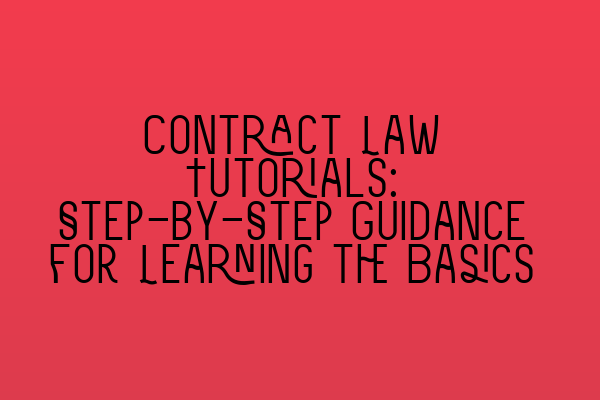Contract Law Tutorials: Step-by-Step Guidance for Learning the Basics
Welcome to SQE Contract Law, your one-stop destination for all your contract law tutorial needs. If you’re studying for the Solicitors Qualifying Examination (SQE) or simply looking to enhance your understanding of contract law, you’ve come to the right place. In this comprehensive guide, we will provide you with step-by-step guidance to help you master the basics of contract law.
Why is Contract Law Important?
Contract law forms the foundation of commercial transactions and is a crucial aspect of legal practice. Understanding contract law is vital for aspiring solicitors and legal professionals as it governs agreements, obligations, and rights between parties. Whether you’re drafting contracts, negotiating terms, or litigating contract-related disputes, having a solid understanding of contract law is essential to succeed in the legal field.
Step 1: Introduction to Contracts
Our first step in your contract law tutorial journey starts with an introduction to contracts. We will delve into the fundamental concepts, including the definition and elements of a contract, offer and acceptance, consideration, and intention to create legal relations. Having a clear understanding of these key components will lay a solid groundwork for your contract law knowledge.
Don’t forget to test your understanding of contract law with our SQE 1 Practice Exam Questions.
Step 2: Formation of Contracts
In this step, we will explore how contracts are formed and the various types of agreements. We will cover topics such as invitation to treat, unilateral contracts, bilateral contracts, and the role of consideration. You will learn how to identify valid, void, voidable, and unenforceable contracts, as well as the significance of privity of contract.
Ready for some hands-on practice? Take a look at our SQE 1 Practice Mocks FLK1 FLK2.
Step 3: Terms and Interpretation
Understanding the terms and interpretation of contracts is crucial to ensure clarity and avoid disputes. In this step, we will cover express terms, implied terms, conditions, warranties, and innominate terms. We will also delve into the rules of contract interpretation and how courts determine the intended meaning of contractual provisions.
Step 4: Discharge of Contracts
Contracts can be discharged in various ways, so it’s crucial to understand these different methods. We will walk you through the concepts of performance, breach, frustration, and rescission of contracts. You will learn about the rights and remedies available to parties in case of contract breach or frustration of purpose.
Step 5: Remedies for Breach of Contract
When a contract is breached, parties may seek remedies to compensate for the loss or restore the contract’s performance. In this step, we will cover damages, specific performance, injunctions, and other remedies available under contract law. Understanding these remedies will help you advise clients effectively and assess the potential outcomes in contract disputes.
Step 6: Special Types of Contracts
Contracts come in various forms, each with its own unique considerations. In this step, we will explore special types of contracts, such as contracts for the sale of goods, consumer contracts, agency agreements, and more. We will dive into the specific rules and principles that govern these specialized contracts.
For comprehensive exam preparation, check out our SQE 2 Preparation Courses and SQE 1 Preparation Courses.
Stay Updated with SRA SQE Exam Dates
Are you planning to take the SQE exams soon? Don’t forget to stay up to date with the latest exam dates and deadlines. Visit our page on SRA SQE Exam Dates to ensure you don’t miss any important information.
We hope this step-by-step tutorial has provided you with a solid foundation in contract law. Remember, practice makes perfect, so continue to review and reinforce your understanding of contract law through real-world scenarios and case studies. With dedication and the right resources, you’ll be well on your way to mastering contract law and achieving success in your legal career.
